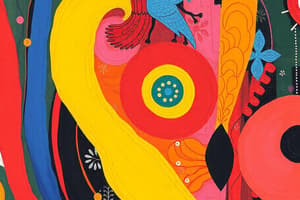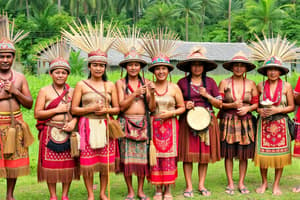Podcast
Questions and Answers
What does Filipino craftsmanship primarily reflect in its products?
What does Filipino craftsmanship primarily reflect in its products?
- Tourist preferences
- Modern technological advancements
- Cultural stories and traditions (correct)
- Economic strategies
Which of the following materials is commonly used in traditional Philippine folk architecture?
Which of the following materials is commonly used in traditional Philippine folk architecture?
- Plastic and glass
- Concrete and steel
- Bamboo and wood (correct)
- Bricks and tiles
What encompasses the arts and crafts in the Philippines?
What encompasses the arts and crafts in the Philippines?
- A mix of various artistic influences (correct)
- Foreign artistic techniques
- Exclusively performing arts
- Only visual arts products
Which of the following best characterizes the approach of Filipino artists to their crafts?
Which of the following best characterizes the approach of Filipino artists to their crafts?
What aspect of craftsmanship is emphasized in the depiction of Filipino creative crafts?
What aspect of craftsmanship is emphasized in the depiction of Filipino creative crafts?
What are the characteristics of the traditional kubo houses?
What are the characteristics of the traditional kubo houses?
Which of the following best describes the Balangay?
Which of the following best describes the Balangay?
What distinguishes weaving in the Philippines today?
What distinguishes weaving in the Philippines today?
What is the significance of the Butuan boats?
What is the significance of the Butuan boats?
Which of the following statements about the Daru Jambagan is true?
Which of the following statements about the Daru Jambagan is true?
Study Notes
Indigenous Creative Crafts
- Craftsmanship has been integral to Philippine history, reflecting the culture and essence of the Filipino identity.
- Filipino craftsmen utilize abundant natural resources to create products that narrate stories of their lives and their culture.
- Creative artworks in the Philippines embody the passion, involvement, and cultural appreciation of the artists.
Overview of Philippine Arts and Crafts
- Philippine arts encompass diverse forms that have evolved since ancient civilization, influenced by various artistic traditions.
- Traditional arts include folk architecture, maritime traditions, weaving, carving, and folk performing arts, among others.
Folk Architecture
- Folk architecture varies by ethnic group, using materials like bamboo, wood, rock, and grass.
- Notable structures include:
- Bahay Kubo: traditional hut using local materials.
- Daru Jambagan: royal palace of the Sultanate of Sulu.
- Bahay na Bato: stone house from the Spanish colonial period.
Maritime Transport
- Traditional maritime structures like boats were crucial for inter-island connectivity.
- The Balangay and ancient ships like Karakowa showcase early boat-making traditions, with evidence dating back to 320 AD.
Weaving Techniques
- Weaving remains a vital art, comprising various techniques like back-strap and loom weaving.
- Common materials include cotton, abaca, and palm fibers.
- Distinct tribal textiles reflect community identities:
- Ifugao: known for intricate shawls.
- T’boli: designs featuring natural motifs.
- Maguindanao: famous for the malong, a versatile garment.
Basketry
- Basket weaving features intricate designs for functional uses like storage and transport.
- This art form is believed to have migrated with early settlers to the Philippines.
Carving
- Woodcarving is a significant traditional art, with many designs originating before Spanish colonization.
- The Bulol statue carved by the Ifugao represents cultural beliefs and practices.
Folk Graphic and Plastic Arts
- This includes tattoo art, folk writing (suyat scripts), and folk paintings.
- Scripts served various ethno-linguistic groups before and during colonization, with only a few surviving today.
Ornament, Textile, or Fiber Art
- Hat-making and mask-making are important cultural practices, often seen in festivals.
- Indigenous hats, like the tabungaw, showcase craftsmanship from local materials.
Art vs. Craft
- Art is a personal expression focused on aesthetic beauty and emotional impact.
- Craft involves skilled labor to produce functional items and is often hobby-based.
- Both can overlap in terms of creativity, but crafts are generally more utilitarian than fine arts.
Craft and Its Aesthetic Value
- Crafts can be aesthetically pleasing and require significant skill.
- Many people struggle to differentiate between art and craft, but each serves unique cultural roles and purposes.
Studying That Suits You
Use AI to generate personalized quizzes and flashcards to suit your learning preferences.
Related Documents
Description
This quiz explores the introduction to indigenous creative crafts in the Philippines, focusing on craftsmanship and cultural heritage. It highlights the Filipino's innate creativity and their connection to the essence of their history through crafts like coconut and fiber art.




